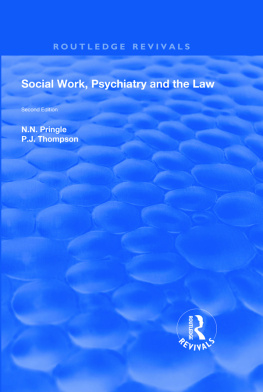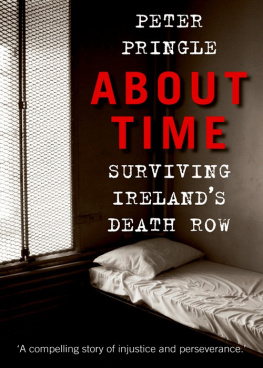SOCIAL WORK, PSYCHIATRY AND THE LAW
For our wives, Vivienne and Josephine
Social Work, Psychiatry and the Law
Second Edition
N.N. Pringle and P.J. Thompson
First published 1999 by Ashgate Publishing
Reissued 2018 by Routledge
2 Park Square, Milton Park, Abingdon, Oxon OX14 4RN
52 Vanderbilt Avenue, New York, NY 10017
Routledge is an imprint of the Taylor & Francis Group, an informa business
Copyright N. N. Pringle and P. J. Thompson 1999
All rights reserved. No part of this book may be reprinted or reproduced or utilised in any form or by any electronic, mechanical, or other means, now known or hereafter invented, including photocopying and recording, or in any information storage or retrieval system, without permission in writing from the publishers.
Notice:
Product or corporate names may be trademarks or registered trademarks, and are used only for identification and explanation without intent to infringe.
Publishers Note
The publisher has gone to great lengths to ensure the quality of this reprint but points out that some imperfections in the original copies may be apparent.
Disclaimer
The publisher has made every effort to trace copyright holders and welcomes correspondence from those they have been unable to contact.
A Library of Congress record exists under LC control number: 98052026
ISBN 13: 978-1-138-35170-7 (hbk)
ISBN 13: 978-0-429-43512-6 (ebk)
Contents
Norman Pringle, RMN, CQSW is an ASW and Mental Health Consultant.
Paul Thompson, CQSW, PGCE, MBA, UKCP Registered Psychotherapist, is an ASW External monitor/assessor and principal lecturer in social work at the University of East London.
ADHDattention deficit hyperactivity disorderBCPBritish Confederation of PsychotherapistsCCETSWCentral Council for the Education and Training of Social WorkersCKWcommunity keyworkerCPAcare programme approachCPNcommunity psychiatric nurseECTelectroconvulsive therapyMAOImonoamine oxidase inhibitorPACEPolice and Criminal Evidence Act 1984RMOResponsible Medical OfficerSDATSenile Dementia Alzheimer-TypeSTGSpecial Transitional GrantUKCPUnited Kingdom Council for Psychotherapy
Since the publication of the first edition of this book there has been a virtual transformation in the provision of mental health services. Many long-stay psychiatric asylums have been closed. Community care has been introduced. Law, policy and practice have necessitated institutional change although, at an operational level, resources and perceptions have not always kept pace with change, resulting in increased levels of stress - for service users and service providers - and sometimes public tragedy.
The revision of our book at this time is an attempt to help make sense of these changes from a social work perspective as well as contribute to the debates about what creates good professional and interprofessional practice. If we have not always provided the correct answers we hope that we have stimulated constructive debate and helped workers find some helpful thoughts and concepts.
Whilst family and friends create innumerable rich influences on any piece of written work, we would especially like to thank Kate Trew, our editor at Arena for her patience and advice in the preparation of our text, and Margaret Edwards who typed it all up into a coherent whole.
Gratitude is also owed to our clients, patients and students. Examples of work or situations presented in the text are drawn from many facets of our experience so as to ensure confidentiality whilst conveying something of the complexities of contemporary mental health practice.
Copyright note
We would like to thank the Editor of Practice - A Journal of the British Association of Social Workers where the following chapters or subsections first appeared as articles in the editions indicated.
'Impossible clients - impossible social workers' (in ): 'The Impossible Client', 8 (4), 1996.
'Ethical Issues in ASW Practice' (): 'Practice at the Outer Limits', 9 (4), 1997.
Section 135 (in ): 8 (4), 1996.
'Developing a Psychotherapeutic Approach to Approved Social Work' (): Approved Social Work and Psychotherapy, 9 (2), 1997.
We have attempted, in the pages of this book, to draw together the many strands of contemporary approaches to social work, psychiatry and the law into a coherent framework. As our brief reflections on the history of mental health law and treatment in show, there are a large number of factors at work in this field. Those chapters also deal with current law, policy, practice and treatment. At the time of writing, the mental health scene is still undergoing change, with concerns now being voiced about 'care in the community', the possible recognition of the need for more resources and a review of mental health services and, perhaps, legislation. At the time of writing, the debate about compulsory treatment in the community in the form of community treatment orders remains unresolved.
In the meantime, approved social workers, nurses (whether in the community or in hospitals) doctors, police, and relatives are still called upon to cope continually on a day-to-day basis, in sometimes near-impossible circumstances. offer reflections and guidance for the day-today understanding and management of core issues in relation to a broad spectrum of service user groups.
addresses the issue of cultural diversity and the need for awareness, knowledge, sensitivity but, above all, respect, when working with difference.
goes on to look at issues of dangerousness, both to self and others.
The final three chapters deal with different aspects of what might be termed professional and personal survival, including ethical dilemmas, Introduction before closing with an attempt to draw the disparate elements of the approved social worker's role into an integrated, and potentially optimistic, vision of therapeutic potential.
The history of mental health provision reflects the changing social attitudes towards the mentally ill. During the eighteenth century, when the Poor Law officers were authorised to detain paupers in madhouses under the Vagrancy Acts, the main aim was to control, contain and keep the mentally ill out of sight from the rest of the community. The mid-nineteenth century until the mid-twentieth century witnessed the emergence of the vast mental hospitals which were mainly built in the countryside at a distance from the population at large. However, in the second half of the twentieth century we began to turn away from the concept of institutional care within mental hospitals. The population of these hospitals peaked in 1954.
The introduction, in the early 1950s, of neuroleptic or antipsychotic medication had very important repercussions on the mentally ill patient's state of mind, for it calmed hallucinations and delusions and made many accessible to other forms of therapeutic interventions. In turn public opinion began to change, and mental illness - previously a taboo subject - came to be discussed like any other illness. This pharmacological revolution of the 1950s changed the face of the mental hospital, and professionals and the public were prepared to take risks. This manifested itself in more openness within the hospital and an open-door policy which began to anticipate further changes towards care in the community.









